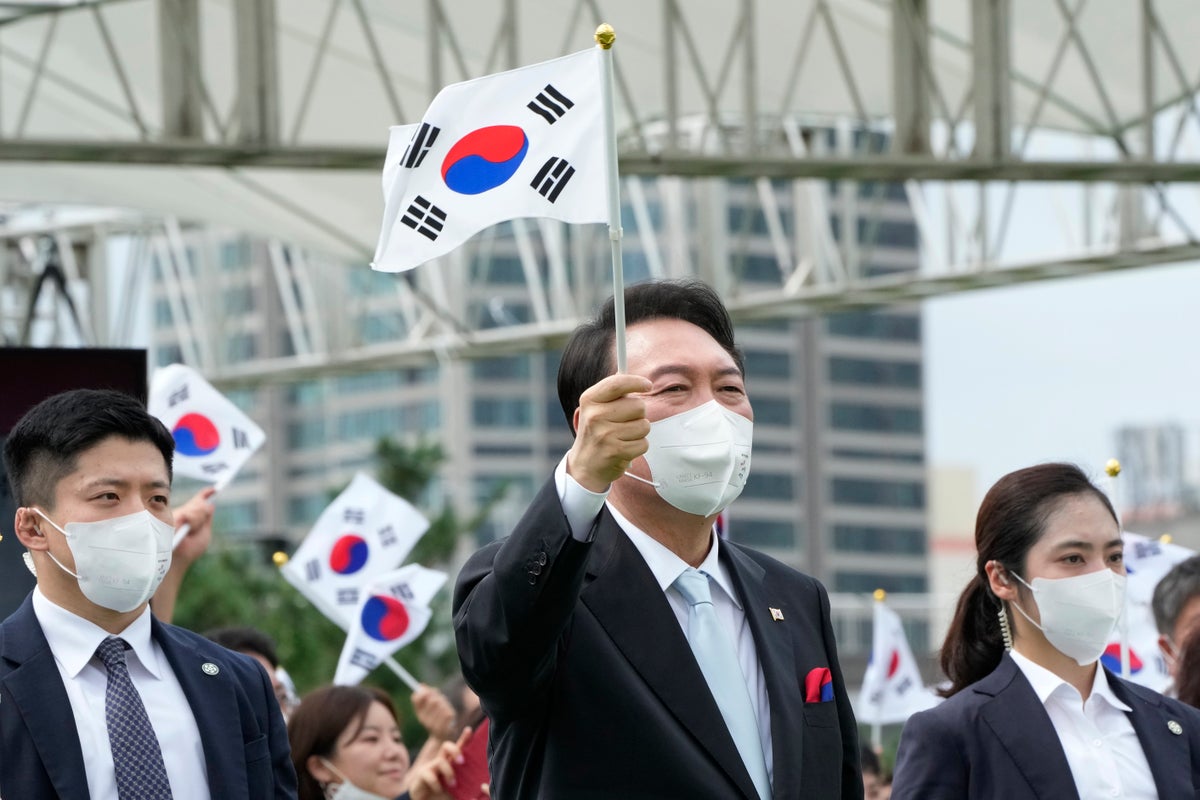
South Korean President Yoon Suk Yeol on Monday offered “audacious” economic assistance to North Korea if it abandons its nuclear weapons program while avoiding harsh criticism of the North days after it threatened “deadly” retaliation over the COVID-19 outbreak it blames on the South.
In a speech celebrating the end of Japan’s colonization of the Korean Peninsula, Yoon also called for better ties with Japan, calling the two countries partners in navigating challenges to freedom and saying their shared values will help them overcome historical grievances linked to Japan’s brutal colonial rule before the end of World War II.
Yoon’s televised speech on the liberation holiday came days after North Korea claimed a widely disputed victory over COVID-19 but also blamed Seoul for the outbreak. The North insists leaflets and other objects flown across the border by activists spread the virus, an unscientific claim Seoul describes as “ridiculous.”
North Korea has a history of dialing up pressure on the South when it doesn’t get what it wants from the United States, and there are concerns that North Korea’s threat portends a provocation, which could possibly be a nuclear or major missile test or even border skirmishes. Some experts say the North may stir up tensions around joint military exercises the United States and South Korea start next week.
Yoon, a conservative who took office in May, said North Korea’s denuclearization would be key for peace in the region and the world. If North Korea halts its nuclear weapons development and genuinely commits to a process of denuclearization, the South will respond with huge economic rewards that would be provided in phases, Yoon said.
Yoon’s proposal wasn’t meaningfully different from previous South Korean offers that have already been rejected by North Korea, which has been accelerating its efforts to expand its nuclear weapons and ballistic missiles program leader Kim Jong Un sees as his strongest guarantee of survival.
“We will implement a large-scale program to provide food, providing assistance for establishing infrastructure for the production, transmission and distribution of electrical power, and carry out projects to modernize ports and airports to facilitate trade,” Yoon said.
“We will also help improve North Korea’s agricultural production, provide assistance to modernize its hospitals and medical infrastructure, and carry out initiatives to allow for international investment and financial support,” he added, insisting that such programs would “significantly” improve North Korean lives.
Inter-Korean ties have deteriorated amid a stalemate in larger nuclear negotiations between Washington and Pyongyang, which derailed in early 2019 over disagreements in exchanging a release of crippling U.S.-led sanctions against the North and the North’s disarmament steps.
North Korea has ramped up its testing activity in 2022, launching more than 30 ballistic missiles so far, including its first demonstrations of intercontinental ballistic missiles since 2017. Experts say Kim is intent on exploiting a favorable environment to push forward his weapons program, with the U.N. Security Council divided and effectively paralyzed over Russia’s war on Ukraine.
North Korea’s unusually fast pace in weapons demonstrations also underscore brinkmanship aimed at forcing Washington to accept the idea of North Korea as a nuclear power and negotiating badly economic benefits and security concessions from a position of strength, experts say. The U.S. and South Korean governments have also said the North is gearing up to conduct its first nuclear test since September 2017, when it claimed to have detonated a nuclear warhead designed for its ICBMs.
In face of growing North Korean threats, Yoon has vowed to bolster South Korea’s defense in conjunction with its alliance with the United States and also strengthen security ties with Japan, which is also alarmed by the North’s nuclear and ballistic weapons program.
South Korea’s relations with Japan declined to post-war lows over the past several years as the countries allowed their grievances over history to extend to other areas including trade and military cooperation.
While Yoon has called for future-oriented cooperation with Japan, history may continue to pose an obstacle to relations. The countries have struggled to negotiate a solution after Japanese companies rejected South Korean court rulings in recent years to compensate South Koreans who were subject to wartime industrial slavery, an issue that could cause further diplomatic rupture if it results in the forced sales of the companies’ local assets.
“In the past, we had to unshackle ourselves from Imperial Japan’s political control and defend our freedom. Today, Japan is our partner as we face common threats that challenge the freedom of global citizens,” Yoon said. “When South Korea and Japan move toward a common future and when the mission of our times align, based on our shared universal values, it will also help us solve the historical problems that exist between our two countries.”
While Washington has said it would push for additional sanctions if North Korea conducts another nuclear test, the prospects for meaningful punitive measures are unclear. China and Russia recently vetoed U.S.-sponsored resolutions at the U.N. Security Council that would have increased sanctions on the North over its ballistic missile testing this year.
North Korea’s state media said Monday that Kim exchanged messages with Russian President Vladimir Putin and celebrated their strengthening ties.
Kim said the countries’ relations were forged by the Soviet contributions in Japan’s World War II defeat and that they were strengthening their “strategic and tactical cooperation and support and solidarity” in the face of enemies’ military threats. Putin said closer ties between the countries would help bring stability to the region, the North’s official Korean Central News Agency said.
North Korea has repeatedly blamed the United States for the crisis in Ukraine, claiming the West’s “hegemonic policy” justified Russia’s offensive in Ukraine to protect itself.







